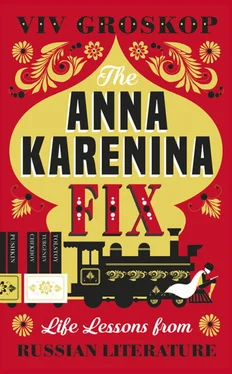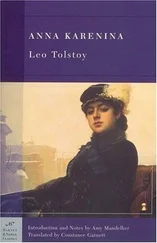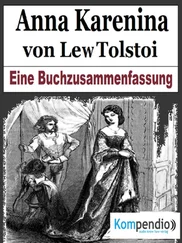Viv Groskop - The Anna Karenina Fix - Life Lessons from Russian Literature
Здесь есть возможность читать онлайн «Viv Groskop - The Anna Karenina Fix - Life Lessons from Russian Literature» весь текст электронной книги совершенно бесплатно (целиком полную версию без сокращений). В некоторых случаях можно слушать аудио, скачать через торрент в формате fb2 и присутствует краткое содержание. Город: London, Год выпуска: 2017, ISBN: 2017, Издательство: Fig Tree, Жанр: Публицистика, Критика, на английском языке. Описание произведения, (предисловие) а так же отзывы посетителей доступны на портале библиотеки ЛибКат.
- Название:The Anna Karenina Fix: Life Lessons from Russian Literature
- Автор:
- Издательство:Fig Tree
- Жанр:
- Год:2017
- Город:London
- ISBN:978-0-241-98126-9
- Рейтинг книги:3 / 5. Голосов: 1
-
Избранное:Добавить в избранное
- Отзывы:
-
Ваша оценка:
- 60
- 1
- 2
- 3
- 4
- 5
The Anna Karenina Fix: Life Lessons from Russian Literature: краткое содержание, описание и аннотация
Предлагаем к чтению аннотацию, описание, краткое содержание или предисловие (зависит от того, что написал сам автор книги «The Anna Karenina Fix: Life Lessons from Russian Literature»). Если вы не нашли необходимую информацию о книге — напишите в комментариях, мы постараемся отыскать её.
‘A passionate, hilarious, joyful love letter to Russian literature’ Allison Pearson, Sunday Telegraph
‘A delightful primer and companion to all the authors you are ashamed to admit you haven’t read’ The Times
The Anna Karenina Fix: Life Lessons from Russian Literature — читать онлайн бесплатно полную книгу (весь текст) целиком
Ниже представлен текст книги, разбитый по страницам. Система сохранения места последней прочитанной страницы, позволяет с удобством читать онлайн бесплатно книгу «The Anna Karenina Fix: Life Lessons from Russian Literature», без необходимости каждый раз заново искать на чём Вы остановились. Поставьте закладку, и сможете в любой момент перейти на страницу, на которой закончили чтение.
Интервал:
Закладка:
My family had no sensible answers about the origin of our name. My grandad would talk about it, if pressed, from time to time, only so that we could tease him about the name ‘definitely not being German’. He was in the Royal Air Force during the Second World War and was happy for the name to come from anywhere at all on the face of the earth so long as it was not Germany. I soon gravitated towards languages at school and quickly worked out that he was right: it couldn’t be German. We would be Grosskopf. (‘Bighead.’) And we were not Grosskopf. This, at least, I decided, was some mercy. Then Dutch was mentioned as a possibility. But again, the spelling didn’t seem right. There was even a crazy idea that we were South African. The name came from Afrikaans, supposedly similar to Dutch. I struggled to believe this.
The lack of information made me obsessive about origins and names. When I was four years old, we acquired a cat, a cute little tortoiseshell thing. I was allowed to name her. I called her Jane. She brought me a lot of comfort, even though I later became aware that I had saddled the cat with a feline name just as unlikely for her as my human name was for me. (Who calls a cat Jane?) For years, I dreamed of having the surname Smith. This to me was a wonderful, beautiful name, one no one would ever mispronounce or spell incorrectly. And no one would ever ask where you came from.
It wasn’t until I was about twelve or thirteen that I picked up a copy of Anna Karenina . I got it in a charity shop, I think, in the mid-1980s. It was an old Penguin Classic. The cover features the painting that has come to be the most frequent stand-in for Anna Karenina: Ivan Kramskoi’s Portrait of an Unknown Woman of 1883. I loved that picture, but the name sold the novel to me first. Karenina. A name that is simple and yet one that people hesitate to pronounce. I knew some people said it as ‘Carry Nina’, but you should say it ‘Kar-ray-ni-na’, with the emphasis on the ‘ray’. I fell in love with her name. And then I fell in love with her face. The moment I saw this stunning woman, all velvet coat, alabaster skin, fur-trimmed beret and air of mystery, my spotty, chubby, insecure adolescent self thought: ‘This is the me I have been looking for. Definitely not German, Dutch or South African. But why not Russian?’ It was a half-thought that was to change the course of my life.
The identity of the model in the Kramskoi painting is unknown and, to protect the blushes of my twelve-year-old self, we will overlook the fact that she was most likely a prostitute. Although Kramskoi never said the woman was meant to be Anna Karenina, it’s entirely possible that he read the novel and had her in mind when he painted the portrait, whether consciously or not. He had painted Tolstoy in 1873, when the novelist was just starting to write the novel. We can’t know for sure, though, that this is her. Nevertheless, it says a lot that many people have wanted to see Anna Karenina in this picture. We want the Unknown Woman to be real. Especially those of us who have wanted to be her.
This isn’t a great ambition, incidentally, as it is doomed to failure. On first reading, I became obsessed with the thickness of Anna Karenina’s eyelashes. Tolstoy loves the details of women’s faces. He writes of Anna having eyelashes so thick that they make her grey eyes look darker. Inspired by this bewitching beauty, I started using an eyelash curler to achieve a similar effect. If you’ve never seen an eyelash curler, it’s like a miniature medieval torture instrument and must be employed with great care and skill. One day, I got a bit distracted and sneezed while using it. I had pulled out all my eyelashes on one side, giving me a naked eyelid and a lopsided squint. It took about a year for them to grow back. Much later on, I discovered that, in an earlier draft, Tolstoy had given Anna Karenina a hairy upper lip. That would have been easier for me to work with, and a lot less painful than the accidental eyelash removal. Liza in War and Peace also has a moustache. Clearly, Tolstoy had a fetish.
The desire to identify with Anna Karenina as a character – to believe her to be ‘real’, to believe her to be ‘us’ – is understandable. It’s one of the most attractive things about the novel. Although, on the surface of things, Anna Karenina seems to be a morality tale about a doomed, beautiful but adulterous romance, really this is a book about identity, integrity and our purpose in life. Who are we and why are we here? These questions are deeply embedded in it. They are questions that tortured Tolstoy and, almost as soon as he had published Anna Karenina , they caused him to renounce his work and retreat into himself. It’s partly this feeling of crisis that has made me feel bound to this novel my whole life. It’s a fantastic meditation on identity and what we’re doing here. But it doesn’t really answer any questions. To such an extent that it’s enough to drive you mad. In fact, it almost drove Tolstoy to suicide.
However, it’s easy to read Anna Karenina without becoming a tortured religious maniac. Because it is a cracking story. Anna Arkadyevna Karenina is the wife of Alexei Alexandrovich Karenin, a government minister. She is a woman in her mid to late twenties. Her husband is two decades older. She is bored and disillusioned with her life. She finds herself drawn to an extremely attractive young officer called Vronsky, who is not a particularly unpleasant person but does not have much more than his looks to recommend him. Their love affair is passionate and tender but, ultimately, Anna cannot enjoy it because she feels guilty, not so much because of her irritating husband, Karenin, but because of her maternal responsibilities to her young son, Seryozha, whom she loves very much. (Diminutive alert: Seryozha is short for Sergei.) In the moment that she resolves to divorce Karenin and risk no longer being a part of her child’s life, she loses her nerve and disappears under the wheels of a train. Bad times.
In the course of the novel, Tolstoy weaves the parallel tale of Levin, a principled, intellectual young man whose character is – surprise, surprise! – not unlike that of our esteemed author (who, at the time of writing, has already had success with War and Peace and is no stranger to Great Literature). Levin is a friend of Anna’s brother Stiva. There’s another link, too: Stiva’s sister-in-law Kitty has attracted the attentions of both Levin and Vronsky (initially, before he becomes involved with Anna). Levin’s emerging relationship with Kitty, one that represents contentment and peace but also (potentially) boredom and predictability, serves as a point of comparison for the romance between Vronsky and Anna, whose union symbolizes anxiety and the breaking of trust but also excitement and risk. This parallel between the two couples is something that is not often noted but it is crucial in understanding the point Tolstoy is making about the nuances of happiness and knowing who we are. Without Anna’s seduction of Vronsky (or vice versa), Kitty might not have been free to go off with Levin. One person’s happiness is often dependent on the unhappiness of another. And what we think of as unhappiness may ultimately lead to happiness. (Kitty is not supposed to end up with Vronsky. They would not have been good together.)
On the surface, Anna Karenina is about relationships and, more importantly, about the perils of infidelity. But Tolstoy messes up his own message by falling in love with Anna Karenina and by making her supposedly ‘unhappy’ life more ambiguous than perhaps he had intended. There’s a moralistic thread running through the book, certainly. And Anna Karenina herself receives the most severe punishment. But the way Tolstoy writes about her, you can sense that he sympathizes with her. The lesson in the novel is that we must try to know who we really are in order to live an authentic life. Anna realizes that her life with Vronsky is authentic but unachievable, and feels she has no option but to kill herself. If you wanted to read something revolutionary into the novel, that is definitely an option. Instead of a comment on how ‘wrong’ Anna is, her death could represent a judgement on the morals of the society of the time. ‘Look what you’ve made her do, when her only crime was to fall in love and be who she really is.’ If anything, the message Tolstoy imparts in Anna Karenina is a compromised one. Levin’s way of life seems the ‘correct’ one. And yet it is Anna who appears to be truly alive, even though she is ultimately doomed to punishment.
Читать дальшеИнтервал:
Закладка:
Похожие книги на «The Anna Karenina Fix: Life Lessons from Russian Literature»
Представляем Вашему вниманию похожие книги на «The Anna Karenina Fix: Life Lessons from Russian Literature» списком для выбора. Мы отобрали схожую по названию и смыслу литературу в надежде предоставить читателям больше вариантов отыскать новые, интересные, ещё непрочитанные произведения.
Обсуждение, отзывы о книге «The Anna Karenina Fix: Life Lessons from Russian Literature» и просто собственные мнения читателей. Оставьте ваши комментарии, напишите, что Вы думаете о произведении, его смысле или главных героях. Укажите что конкретно понравилось, а что нет, и почему Вы так считаете.












